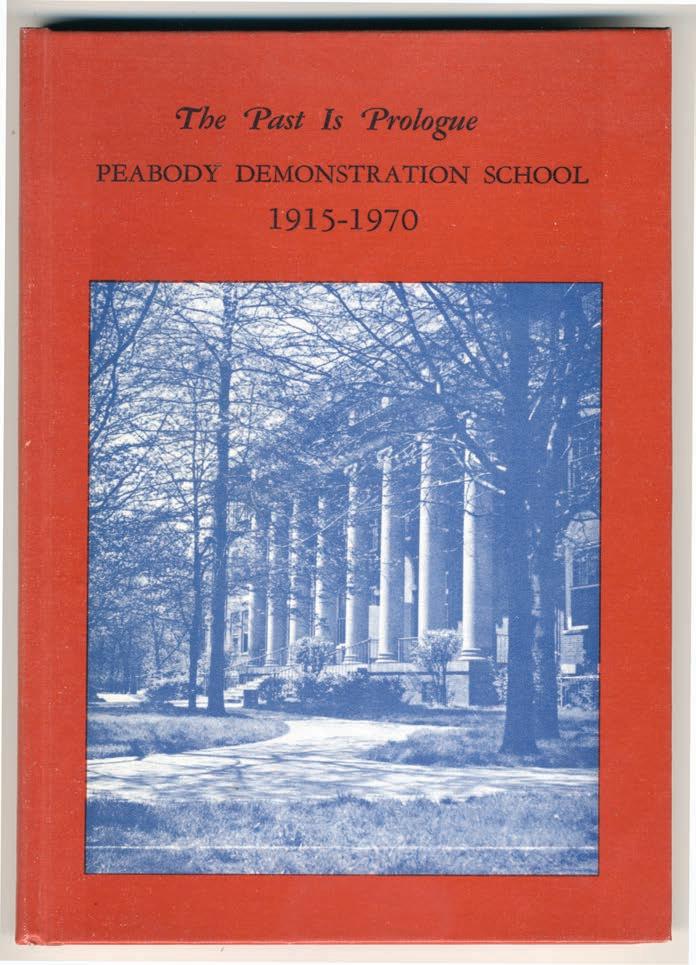
40 minute read
Capturing History
‘Past is Prologue’ captured PDS history during pivotal time
During Reunion weekend in spring 2020, four members of the Class of 1970, Jim Coddington, Bruce Davis, Ann Schoggen Hammonds, and Julie Reichman, talked with Archivist Jenny Winston about creating “The Past is Prologue,” our school’s first history book written 50 years ago in Leland Johnson’s American Problems elective. She shares an account here.
By Jenny Winston, Archivist
Ifirst read “The Past is Prologue” when I came to USN in the summer of 2014, on the occasion of our year-long Centennial celebration. It quickly became my go-to source of timeline events in the school’s early history and a constant companion guide in my mission to understand the story of Peabody Demonstration School. What immediately struck me about this book was the fact that it was written by students – seniors, at that – and over the course of just one school year, 1969-1970. How and why did 12 students, with their minds set on post-high school plans, during a pivotal time of social and political change, decide to write a 55-year history of their school? The whole pursuit just sounded unlikely, even as the red-bound proof of its ultimate success sat open daily on my desk.
In reflecting on the experience with us 50 years later during our virtual Reunion in May, members of that class recalled that their new history teacher, Leland Johnson, was the real impetus for the idea.
“An ‘American Problems’ course in 1969? [The history of PDS] wasn’t really what was on our minds. I’m surprised that this was the project,” said Jim Coddington, as we opened our discussion. “Mr. Johnson obviously was very convinced that we would get something relevant to our day out of this.”
Ann Schoggen Hammonds agreed, “He was quietly persuasive.”
Bruce Davis remembered hoping the elective promised an excuse to do something outside the norm of typical classes. “American Problems – this might be a good opportunity to protest somewhere or to go out and sit in the grass … this will be kind of fun,” he said.
“The Past is Prologue,” often referred to as “the red book.”
Johnson himself spoke to the lofty thinking behind the idea in the preface of the book, writing, “During the progress of the study, the history of the Demonstration School began to assume meaning in relation to the history of the nation and the history of developments in American education during the past half century…. the history of the school, in the wider perspective, reflects vigorous conflicts in educational theory and several problems common to the nation – American problems.”
As it turned out, in writing a school account the students in “American Problems” didn’t get that opportunity to protest or hang out on the lawn across the street. What they did gain was an effective crash course in historical research methods and the iterative writing process. Evaluating and exhausting 50 years of materials was no small task.
To gather information for their chapters, the authors consulted the papers of previous director J.E. Windrow and archival materials at the Peabody library, spun through newspaper collections on microfilm at Nashville Public Library, interviewed alumni and former teachers, and dusted off old documents living largely undisturbed in the Dem School building.
“I have a memory of sifting through very dusty, old school newspapers,” Hammonds said, remembering the research for her chapter on student government, “I remember there being a room downstairs in the basement behind the gym where we dug up a bunch of archives that were not particularly well organized…. [I remember] the smell of the old documents.”
Coddington, who wrote about school athletics, had a similar impression. “It was not just an intellectual experience, but it was literally a sensu[ous] experience. The touch of the papers, the feel of old papers,” he said. “Some sense of why [conducting research with primary documents] was important got established over the course of that year. There’s something very real and pleasurable about getting right to that thing that somebody made and did at the time.”
When it came time to write, it was a collaborative effort. Davis, who wrote the chapter on the school’s physical spaces, remembered students reading aloud to each other, workshop style, with a cooperative rhythm akin to college-level writing courses.
Julie Reichman recalled the educational significance of this collaborative writing and editing experience; “You didn’t just write and maybe get some great comments from a teacher and a grade, but your colleagues were giving you feedback. And then, you wrote it again. And again. And again. “[The class was teaching us about] not only having a reason to write, but that it would keep improving and you could see that as you went along, from your colleagues. And the chance to read how someone else approaches something and then give them feedback. For me, the writing process was revealed in that class.”
“He treated us like colleagues,” Hammonds remembered of Johnson and the writing process.
After these 12 seniors submitted their chapters, achieved their final credits for graduation, and sailed through the year-end rites of passage, it was Johnson who compiled the meticulous work of the students and carried the project to its publication the following December. Copies were sold for $10, with the proceeds benefiting a student scholarship fund. Just a few years later in 1974, Peabody College announced the Dem School would close, setting into motion the most significant event in our school’s chronology to date. Turns out, capturing the Dem School’s half-century in a book was not only an ambitious undertaking but also a timely one.
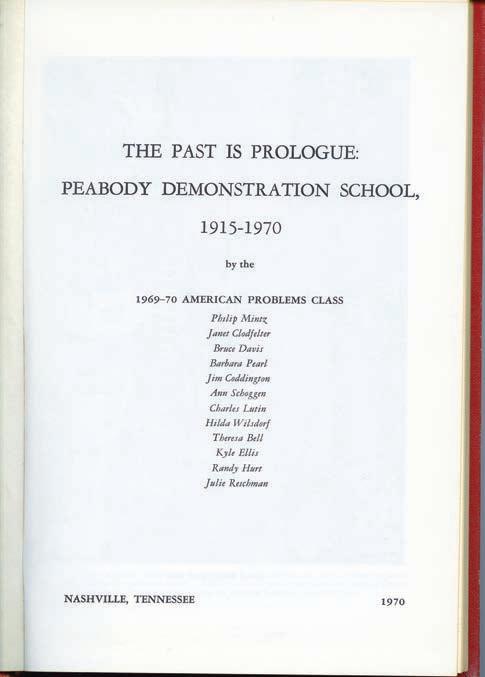
Title page of “The Past is Prologue,” listing the names of the student authors in the “American Problems” class.

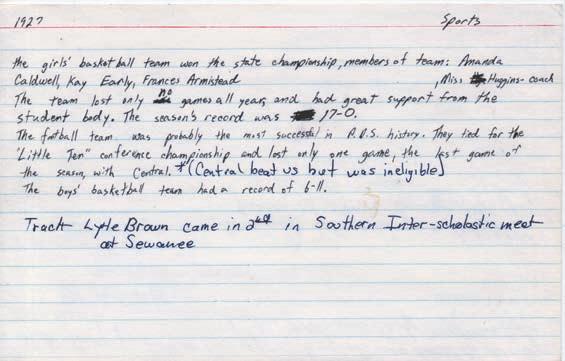
Research notes for the chapter on athletics, donated to the USN archives by Jim Coddington ’70.
Leland Johnson and others selling copies of “The Past is Prologue” outside the PDS auditorium. Photo courtesy of Vanderbilt Special Collections. December 1970 letter from principal Robert Smotherman announcing the publication and sale of “The Past is Prologue.”
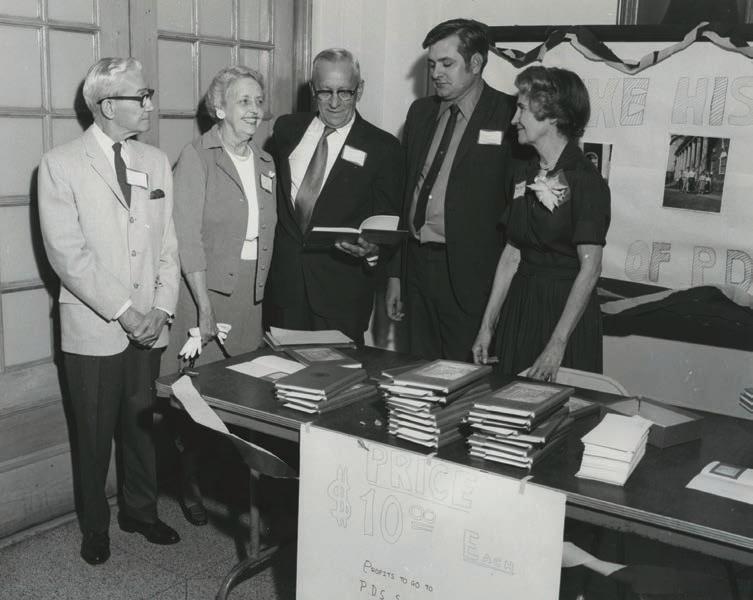
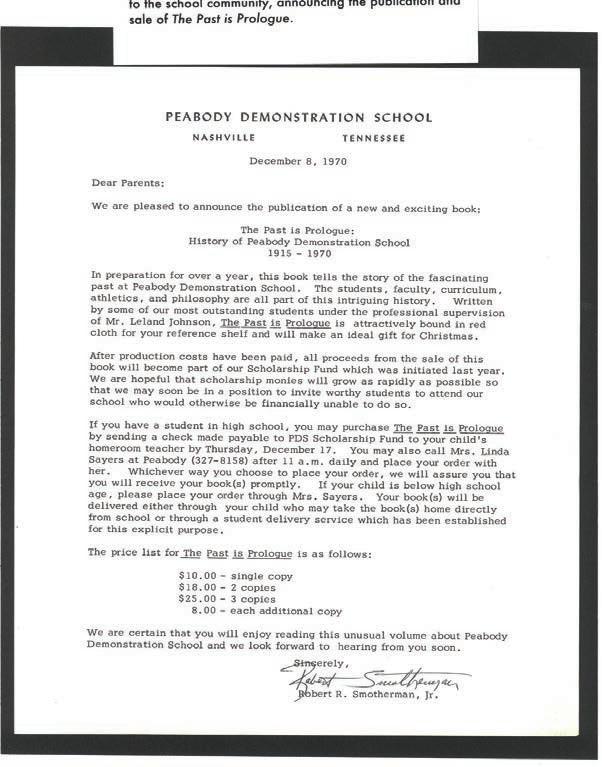
“When I look back on it all I think, how innovative. And it’s just a hallmark of what was Peabody. They empowered a class of kids to go and write a history like this and give us the opportunity to work as colleagues with an instructor and to go out and do real research. It really was a pretty good adventure,” Coddington said.
Fifty years later, and with thanks to Johnson and his dedicated students from the Class of 1970, we refer to “The Past is Prologue” often – to consult lists of early graduates and sports scores and to learn about important events and people. It is an integral piece of the school’s historical record, the value of which could not have been predicted by those 12 PDS students. Today, USN students often are introduced to the book as both a primary and secondary source, prompting great discussions about who writes our stories and why. Director Vince Durnan and his Historical Methods class students of the early 2000s made essential strides in re-
searching and writing stories of PDS/USN from 1970 forward, though we have yet to publish a true student-penned sequel to “The Past is Prologue.” Whether we could achieve such a feat to complete a history of our next 55 years, is a lingering question of interest, time, and resources. But if there’s anything our school’s past has taught me, it’s that the unlikely is always possible. nn Jenny Winston is a librarian and holds professional designation from the Academy of Certified Archivists. She served as the USN archivist from 2014 to 2020 and was instrumental in researching and organizing school records, photos, and artifacts for the school’s centennial celebration and its perpetuity.
To learn more about “The Past is Prologue,” read Julie Reichman’s chapter The Past Was Prologue in “The Same River Twice,” or visit usnarchives.omeka.net/exhibits.


Do you remember the 1969-1970 school year and the writing of this book? Do you remember Leland Johnson? Are you one of the student authors? We’re still learning the story of this book, and it’s not complete without the memories and perspectives of all of you. Please send your thoughts and recollections to jtraughber@usn.org.
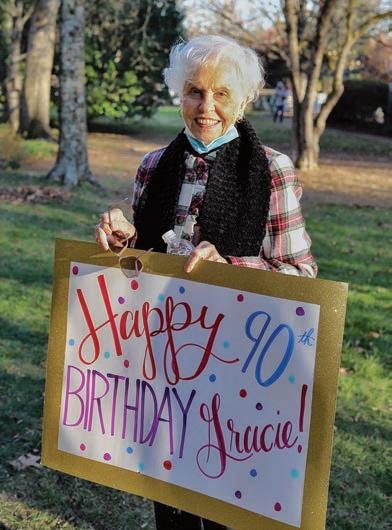
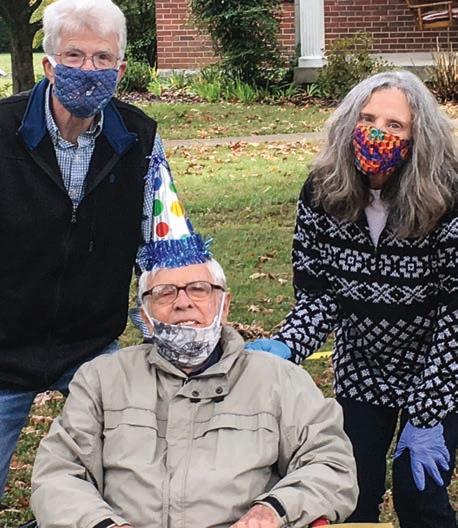
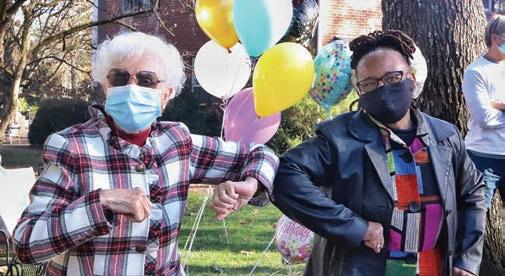
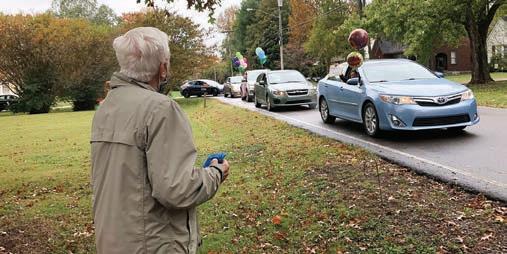
The 90th birthday celebrations for retired USN faculty Heber Rogers and Gracie Allen included well-wishes from Pam Thompson, Les White, and Betty Pearson White.
CLASS NOTES

Class of 1964 lunch, from left to right: Mike Nixon, Steve Furman, Marvin Wilker, Sandra Stone Merritt, Al Lowe, Nan Eisenstein Speller, Susan Hammonds-White, Margo Paty Pickering, Beverly Nelson, Shirley Hopton Cudabac.
FORMER FACULTY
Retired History Teacher, Assistant Director, and Interim Director Heber Rogers celebrated his 90th birthday on October 24, 2020 with more than 20 current and former PDS/USN faculty honoring him in a parade driving by his home. Director of College Counseling Janet Carney Schneider, who will retire from USN in June 2021, was grand marshal. Retired Physical Education Teacher Gracie Allen had an outdoor, socially-distant 90th birthday party in December 2020 with several current and former PDS/USN faculty sharing well-wishes during a drive-through parade.
1964
The Heritage Foundation of Williamson County presented the fourth annual Mary Pearce Legacy Award to Emily Magid. The Heritage Foundation Board selected her based on her ability to inspire others to make significant contributions to historic preservation.
Class of 1964 classmates met for lunch in Nashville.
1965
Capt. Jim Horner shared an article from the April Edition of The Triton, a yachting magazine for mega yacht captains and crew, about the first yacht that he was captain of, The Tennessean Lady, owned by The Tennessean newspaper. He is in Miami after cancelling trips to the West Indies and the Caribbean last summer on the yacht. Jim, who has married many couples on yachts, also officiated the wedding of his daughter Tanya on December 18, 2020, and was able to have both of his daughters home for Christmas.
1968
Class of 1968 meets via Zoom every third Thursday monthly. Email Shannon Paty at theshannonpaty@gmail.com if you are interested in joining.
Continued on page 36
BeyondEdgehill Mark Thompson ’85
Since graduating from University School of Nashville, the Rev. Mark Thompson (also known as Matsimela Mapfumo) has dedicated his life to social justice activism, a cause imbued in him by generations of religious leaders in his family and nurtured through his years of education at USN, Georgetown University and beyond. The host of “Make It Plain,” a live political, human rights and news daily call-in talk show and twice-weekly podcast, Mark is also a regular contributor on MSNBC speaking on a wide range of issues. “Make It Plain” was the first talk show to sign on satellite radio in 2001. He was the first and only African American talk host on SiriusXM Progress, and the only African American in the U.S. hosting a daily, national show on a progressive, liberal talk format.
Outside of the world of media, Mark has worked as an organizer for two of Jesse Jackson’s presidential campaigns (including in 1984 while a student at USN), emceed the Million Man March, and served on the board of the annual Jubilee commemoration of Bloody Sunday, including marching across the Edmund Pettus Bridge an estimated 30 times with the late civil rights leader and U.S. Rep. John Lewis through the years. Mark took time from planning to participate in the August 2020 March on Washington for an interview with classmate Chris Chamberlain ’85.
Q: What is the most significant contribution your USN experience is making in your life today?
A: In Rosemary Scott’s Model UN class, I assumed the role as Zimbabwe. We formed something called UNISAC, the UN Interim South African Commission and actually advocated sending troops to South Africa to end apartheid. John and Susan Marberry got me involved with the student newspaper, and I started writing stories about apartheid and the Jackson campaign. During my first 48 hours at Georgetown, I got involved in protests about apartheid and calling for the school to divest from South Africa. I went straight from “The Paper” to “The Hoya” and continued writing articles about apartheid, and eventually Georgetown did divest. The Marberrys really helped me chart a path where I could integrate my journalism with my activism. If it had not been for my experience at USN, I might have been one of those guys who could only read news off a teleprompter.
Q: What led you to enter the ministry? Q: What advice do you have for USN students today, especially as it relates to the growing movement for Black lives?
A: It’s important that this generation knows that this is nothing new. John Lewis and the march from Selma to Montgomery began as a Black lives matter march because of the killing of Jimmie Lee Jackson. The civil rights movement that began on August 28, 1963, the anniversary of the death of Emmett Till, was a Black lives matter moment as well. This generation needs to not only understand that but also realize that there’s so much more that needs to be done. We cannot stop. We have to imagine and then achieve a world where this is no longer happening. We can literally abolish violent policing from our culture and our society.
They’ve got to stay engaged by being involved in organizations that are doing work. Social media is a good thing, but it also leaves a false sense of accomplishment. Police are governed locally; there is no national policy. We really have no choice but to organize on the ground locally if you want change and reform. We’re not going to be able to tweet away police violence or voter suppression. Dr. Martin Luther King Jr., when he was 25, led a local movement in Montgomery. By having the effect he did locally, it ended up having national impact. Wherever you see people doing incredible work is where you should go. nn

A: I was called to the ministry before I got to USN, I just ran from it. I was a teenager at Clark Memorial United Methodist Church, a significant church in the civil rights movement in Nashville. I felt the call, but I didn’t know if I could be a minister; I thought that was something higher than something I could be. We had a protest at the U.S. Supreme Court one year, I don’t even remember what the issue was. (I’ve been arrested probably about 50 times, and I can’t remember every single arrest and issue.) But I was in jail with my pastor from my church, Israel Baptist Church. One of the gifts of being a pastor is discerning the call in another. We were sitting in the jail cell, and he told me, “Mark, you have a calling on your life.” I asked him, “How did you know?” He said, “I can tell.” He ended up mentoring and guiding me to finally answering my call, and I’m thankful I did.
1971
Director Vince Durnan met with the Class of 1971 for a Zoom meeting to discuss school life on Edgehill.
1972
Manuel Zeitlin, founder and co-owner of Manuel Zeitlin Architects, was featured in the Nashville Business Journal for entering into an employee-owned model with 11 other partners.
1975
The Arthritis Foundation presented Robert Shmerling, M.D., Clinical Chief, Division of Rheumatology at Beth Israel Deaconess Medical Center, with the 2019 Dr. Marian Ropes Award for excellence in arthritis care.
1978
Anthony Williams spoke about the historic organ in Fisk University’s Memorial Chapel during the Nashville Symphony’s 2021 Let Freedom Sing concert series. He is Associate Professor of Music and University Organist at Fisk University in Nashville, where he teaches organ and courses in Music History, including courses in American and African American music.
1979
Edible Nashville featured Lee Ann Harrod Merrick and her business Tinwings in its May/ June issue. The article covered how the success of her catering business allowed her to open her brick and mortar kitchen in The Nations neighborhood of Nashville.
1981
Mary Tanner Bailey performed in “Dolly Parton’s Smoky Mountain Christmas Carol” in December 2019 at the Emerson Colonial Theatre in Boston. Mary performed the roles of the Ghost of Christmas Past and Mrs. Dilber.
Beth Moskovitz Zeitlin has created OneDey. com, a company for conscious consumers to find quality, eco-friendly products made by sustainable focused companies.
1983
The Tennessean published an opinion editorial by Rick Ewing titled “Racism and bigotry today shouldn’t surprise you, but you need to listen and act justly.”
1984
Virginia Delegate Mark H. Levine is a 2021 candidate for lieutenant governor of Virginia. Mark is serving his sixth year in the Virginia House of Delegates.
1989
Jeffrey Jackson’s new book titled “Paper Bullets: Two Artists Who Risked Their Lives to Defy the Nazis,” was published in November 2020 and he spoke during an author event at Parnassas Books in Nashville. Visit jeffreyhjackson.com for more information. The book was named as a 2021 Finalist for the Carnegie Medal for Excellence in Non-Fiction.
Gregory Downs, a historian at the University of California, Davis, was quoted in The New York Times article “Amid the Monument Wars, a Rally for ‘More History.” for his role in organizing a nationwide demonstration to accurately reflect Civil War history, and was also quoted in an article in The New York Times discussing “Sedition: A Complicated History.”
1990
Kristi Jordan Graham, M.D., completed a documentary short film about her father, Harold Jordan, M.D., who is also a former member of the USN Board of Trustees.
Gwynn Crichton graduated from Virginia Theological Seminary in May with a Master’s in Divinity and was ordained in the Episcopal Church as a priest. She and spouse Janean moved to Richmond, Virginia during the summer where she is serving at St. Paul’s Episcopal Church in downtown Richmond as the Associate Rector for Pastoral Care.
1991
Sara Lubow Fried, owner of Fete Nashville, shared her new website fetenashville.com. She plans luxury weddings and events for high-profile clients.
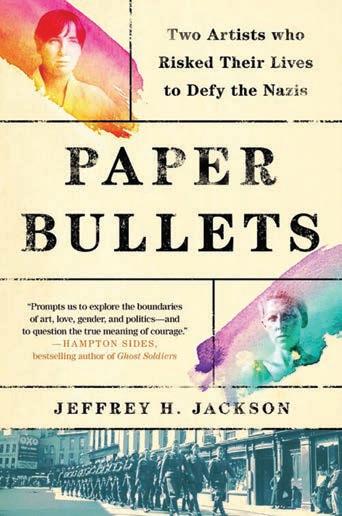
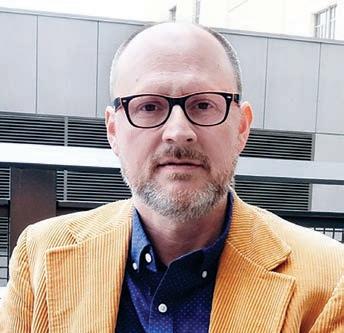
Jeffrey Jackson ’89

Mindy Minnen Gold ’94 and family
1994
Mindy Minnen Gold shares that she and her family are living in Nashville after residing in the Chicago area for more than 20 years. Her two sons are attending USN High School. Mindy founded an education consulting company focusing on relationship-centered learning in online spaces and facilitating educational technology professional learning for teachers and teacher leaders.
1995
Amanda Colleen Williams was at USN last January for a lunchtime concert. She is an awarded songwriter and music publisher with songs on albums certified at 17 million sales by the Recording Industry Association of America®, including “She’s Tired of Boys” written with Garth Brooks. As an educator, entrepreneur, and business owner, Amanda is regularly called on to speak as a non-attorney copyright expert at government institutions including the U.S. Patent and Trademark Office and U.S. embassies and consulates worldwide. She is piloting a program with the U.S. Department of State called Arts Envoy IPR, combining arts diplomacy and intellectual property rights education.
Mitsubishi Motors North America has named Katherine Knight as vice president and general counsel. Most recently, Knight was general counsel for Arkansas-based USA Truck. Previously she spent nearly two and a half years at Nissan and about five and a half years at Dollar General. Knight is a Vanderbilt Law graduate who will be based in Franklin and will oversee all legal services for the company.
Brice Behringer was promoted to captain of the U.S. Merchant Marine as part of the U.S. Naval Auxiliary, Combat Logistics Fleet and Special Missions programs. He is moving back to Nashville from Massachusetts.
1996
Hayley Hovious, President of the Nashville Health Care Council, was featured in an article in Vanderbilt Magazine in January 2020 discussing the economic impact the city’s health care companies have in Nashville.
1997
Eric Appelt, Ph.D., former USN faculty member, spoke with the AP Chemistry class about his work in computer science at Vanderbilt.
1998
Fat Bottom Brewing Company owners Ben and Dru Potash Bredesen joined The Nashville Food Project, Renasant Bank, and Nashville Soccer Club to launch the Community Cupboard initiative to provide food to Middle Tennesseans who have lost their jobs or have been furloughed and are fighting food insecurity.
William Tyler scored his first film, “First Cow,” by well-known female indie film director Kelly Reichardt and introduced it at the Belcourt theater in March. The Music City Film Critics’ Association announced William as winner of the Jim Ridley Award. The award recognizes a Nashville artist or film that best represents our city.
Noah Charney, Ph.D., was a guest speaker for the League of Women Voters of Nashville Hot Topics event. Noah shared the Radnor to River‘s vision for integrating conservation thinking into Nashville’s planning.
1999
Beth Perry Bennett is featured in the Harvard School of Public Health’s Alumni Corner of its fall newsletter. She gave a talk at the Fall American Savings Education Council Meeting about “Creating Paths of Least Resistance for High Savings Levels: New Models in Behavioral Science.”
Emily Thaden is one of 21 housing experts appointed to Nashville Mayor John Cooper’s Affordable Housing Task Force. Emily is a “national affordable housing expert who works in communities across the United States to advance equitable land use and permanently affordable housing solutions.”
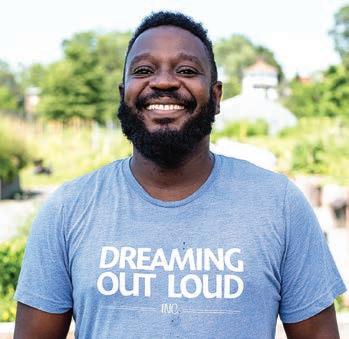
Christopher Bradshaw ’00
2000
Georgetown University named Christopher Bradshaw the 2021 Legacy of a Dream Award recipient, an honor presented annually to an inspirational emerging leader in the Washington community. As Founder and Executive Director of Dreaming Out Loud, he is working to create food equity.
2001
Emily Neumann was in Nashville to produce an episode for “Trisha’s Southern Kitchen.” Emily is the assistant director for the show and was also an assistant director on “Nashville,” “Room 104,” and “Drunk History.”
Kim Sandler Rhodes, M.D., an Assistant Professor at Vanderbilt’s Department of Radiology and Radiological Sciences, was interviewed by WKRN News 2 in November 2020 to discuss “Vanderbilt’s Lung Screening Program working to make sure screenings happen despite pandemic.”
Julia Sullivan was named as one of 10 business leaders likely to leave their mark on Nashville by the Nashville Business Journal in the article “People to Watch in 2021.”
2002
John Simon Guggenheim Memorial Foundation announced Cammie Staros, Artist and Lecturer in Art at California State University, as a 2020 Guggenheim Fellow.
Continued on page 41
usn.org/alumni n BeyondEdgehill Allison Fundis ’99 2020 Distinguished Alumna
In August 2019, Allison Fundis, Chief Operating Officer of the nonprofit Ocean Exploration Trust, set out on a month-long expedition in partnership with National Geographic to solve the mystery of famous aviation pioneer Amelia Earhart. Equipped with the latest technology and scientific expertise aboard the EV Nautilus with Allison as the Expedition Leader, they hoped to end decades of speculation about what happened to the aviation pioneer. National Geographic produced a two-hour documentary, “Expedition Amelia,” about the expedition. The documentary premiered globally in 172 countries and 43 languages that October.
Allison never imagined when she graduated from USN two decades earlier that she would be honored as the 2020 Distinguished Alumna. Her last 15 years have been dedicated to ocean science, research, explorations and education; work that involves a lot of time on a ship at sea in unexplored waters. “It’s fair to say we are all in the same boat right now, wrestling with what the future holds and how to navigate these unexplored waters ahead,” she said during a conversation with Alumni Director Patti Wexler.
Allison uses the quote of early mapmakers who inked the phrase “Here be dragons” on areas of the map that were unexplored and where potential dangers were thought to exist, to explain to USN’s youngest graduates that their paths have already brought them face to face with many more dragons than any of us could have imagined at their age. During her Commencement address, she encouraged the Class of 2020 to take the knowledge gained from hard and valuable lessons and to use passions and voice to take action to bring equality, justice, innovation, discovery and creativity to the world.
Q: Tell us about your expedition with National Geographic on EV Nautilus. Q: How does it feel to have looked for clues to the disappearance of Amelia Earhart?
A: Amelia was ahead of her time in the way she led her life both in air and on land. And her name is synonymous with adventure and bravery. She was a barrier breaker for women’s rights and deftly traversed the world and society to pursue her passion for exploration. She continues to be an inspiration to so many of us more than 80 years later, and being a small part of sharing her legacy is a real honor I am grateful to have.
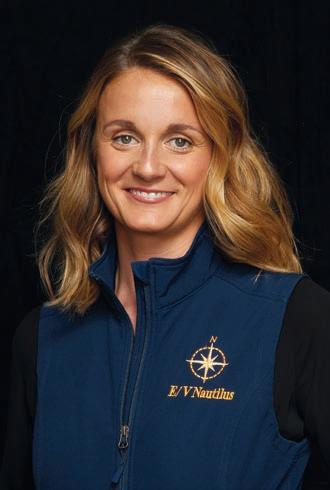
A: In August 2019, Ocean Exploration Trust partnered with National Geographic to conduct the most technologically advanced search for Amelia Earhart’s lost LockHeed Electra airplane. I co-led the expedition with Robert Ballard (President of Ocean Exploration Trust and National Geographic Explorer-at-Large), who is best known for his 1985 discovery of the Titanic shipwreck.
The expedition, which was funded by National Geographic, included an extensive search across both land and sea around an uninhabited Pacific atoll called Nikumaroro in the Republic of Kiribati. We conducted the ocean search aboard EV Nautilus (owned by Ocean Exploration Trust) and were equipped with the latest in seafloor mapping technologies and deep-sea robotic vehicles capable of conducting visual surveys and recovery of suspected artifacts. While we were searching underwater, we also had a shore-based team investigating Earhart’s potential campsite with forensic dogs, DNA sampling, and archaeological digging.
We chose to look for Earhart’s plane at Nikumaroro because of 30 years of prior research that had uncovered some compelling clues that led us to believe that she could have landed her plane there rather than Howland Island, her intended target.
Q: What inspired you to become an expedition leader? What kind of education and professional experience does it take to get into this field?
usn.org/alumni n
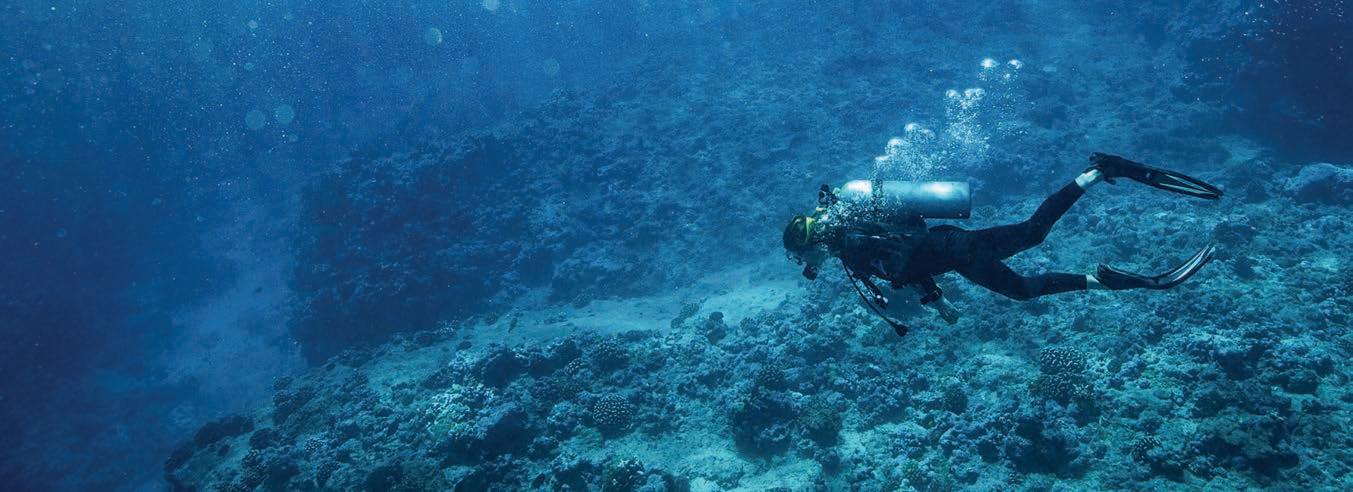

A: I’ve always loved bringing projects, ideas, and people together and that is essentially what I do when I am at sea leading deep-sea exploration expeditions. As an expedition leader, I oversee an expedition from the planning stage through implementation and ensure all teams onboard — scientists, engineers, robotic vehicle pilots, the ship crew, and communications — and those supporting from shore are aligned and able to efficiently carry out the objectives of the mission. I also help prioritize the many simulation goals of each team to keep the expedition on schedule. These expeditions are expensive to implement, and we want to ensure we’re taking advantage of every minute we have at sea.
One of the reasons I got into oceanography and deep-sea exploration is because of the many fields it requires, and it requires a truly interdisciplinary collaboration to pull off a successful expedition. On our team, we have scientists of many kinds (geologists, biologists, archaeologists, chemists, maritime historians), engineers, filmmakers, educators, communication specialists, and maritime professionals. Pretty much any background in STEM or storytelling can lead to a career in deep-sea exploration and research. Q: Twenty years after graduating from USN/PDS, are you where you expected to be at this stage of your career and life?
A: I don’t know that I ever had expectations of being in the role I am today, but I wouldn’t trade it and I’m grateful for all the experiences I’ve had in the past that led me to it. Like most people, I did not take a linear path in my education and career and I think it is those varied experiences that really set me up to succeed in my role.
Q: What is the most significant difference your USN experience is making in your life today?
A: I learned a lot of valuable lessons at USN and formed some of my deepest friendships I still have today. Some of the lessons I took away from USN and still carry with me today are that how you think is more important than what you know, the value of community and individual action, that we all must remain aware of our own biases and live with empathy, and the impact of both having and being good mentors.
Q: What words of wisdom do you have for USN students today?
A: Allow life’s curveballs (and there are many these days) to open doors that you might not have imagined for yourself. As you have doors open and opportunities made available to you, you will have a lot of difficult decisions to make with regard to deviating from what you may at the time think is a linear path to success. Try a lot of things to find what you love doing, do not be afraid of failure, and be open to serendipity. nn
usn.org/alumni n BeyondEdgehill Sam Linton ’08
Sam Linton ’08 was a general surgery resident at SUNY Downstate Health Sciences University in his third year of residency working at Kings County Hospital in Flatbush, Brooklyn when the COVID-19 pandemic hit New York. His experience on the front line of dealing with this disease impacted his personal and professional life in ways he never imagined. Sam discussed with Alumni Director Patti Wexler why he chose the medical field and his experience treating COVID-19 patients.
He lives in Chicago with his wife Mariel Snetman Linton ’08 and their 14-month-old daughter Margot. He is doing a two-year pediatric surgery research fellowship at Ann and Robert H. Lurie Children’s Hospital in Chicago as well as earning a master’s degree in health services and outcomes research at Northwestern University.
Q: Why did you choose medicine?
A: I love medicine because you get to have personal interactions with people who need help, often in a way they have never needed it, but I don’t think I really appreciated that until I started working in the field. Medicine allows you to get to know people in a way you never would know them otherwise. Not just specific people but humanity as a whole. Working in rural Kentucky and urban Brooklyn, you see how similar people are and how they have the same needs, wants, and dreams. It’s a truly unique bond with a person for them to allow you to care for them and earn their trust in things that they may not trust other people with.
Q: How has the pandemic changed your work? Q: You managed a COVID-19 unit in Brooklyn. What was that like?
A: My job changed as I became chief resident of the surgical intensive care unit in April. By then the SICU was designated for COVID-19 patients, not just surgical patients. While the types of patients in our beds changed, our job was the same: be a doctor, and take care of critically ill patients. The real differences were there were no studied treatments and there was a real risk of team members catching what we were seeing to be a rapidly fatal disease. Again, this changed the riskto-benefit ratio of a lot of things we normally do. How could we work to minimize provider contact while also doing everything possible to prevent disease progression? It was and is a mysterious disease, you couldn’t predict who would do well and who wouldn’t.
A: It completely changed my hospital and day to day job. By mid-March we knew it was seriously impacting the population of Brooklyn. We shut down elective surgeries and tried to separate COVID-19 patients from those without. Essentially, we had to treat everyone as if they may have it because tests were slow, symptoms started late, and a huge portion of our patients in Brooklyn got it. At first, things slowed as we got prepared, and then suddenly the emergency room was slammed with patients with COVID-19. First the floors filled, then the intensive care units, then the additional ICU spaces we opened filled. The risk to benefit ratio of being in the hospital changed, leading us to send people away from the ER who would previously be watched in the hospital and to give people antibiotics who would have been operated on in normal times. Q: How did that experience impact you personally?
A: It was incredibly difficult: to see colleagues worried if they would be next to lose consciousness in the hallway; to see friends lose their mentor to a disease they were working so hard to treat and understand; to see people afraid to go home to their family because they couldn’t live with themselves if they passed this on to loved ones; to be afraid to go home to mine; to watch patients die alone and have to tell their families it’s too dangerous to see their family member one last time, not just for them but everyone they know and see.
When I finally felt like I helped people was when I started video calling families and showing them their loved ones a few final times before they died. We had one woman fly from California and stay in a hotel near the hospital for two weeks while she
wasn’t allowed to visit her mom dying in the ICU just so she could be as close as possible. At the same time, it was fascinating to work with people trying to overcome this disease. To learn what worked and what didn’t and to see these patients’ families take it seriously — only going out for essentials, understanding why they can’t come in person, and even calling to ask about medications discussed in COVID-19 related press conferences.
Q: What is the most significant difference your PDS/USN experience is making in your life today?
A: It taught me how to find joy in learning and to value variety of experiences as a way to grow and better understand the world we live in.
usn.org/alumni n
Q: What words of wisdom do you have for USN students today, especially as it relates to the pandemic?
A: Don’t assume you know what other people are going through. And think about how you can best help people. It’s not about what you do but the way you do it. You can’t always change people’s lives in the way that you want, but you can still have a positive impact on them and those around them. nn
Class Notes continued
2003
USN Trustee Bobby Perry, owner of A&H Plumbing, a certified minority-owned business, was quoted in the U.S. Chamber of Commerce newsletter for business owners in September 2020. In the article “6 Tips for Running a Socially Distant Business,” Bobby discusses the Occupational Safety and Health Administration’s COVID-19 guidelines and how his company addresses the safety of employees and customers.
Authority Magazine interviewed Alexandra Connell for “Female Disruptors: How Alexandra Connell of Pluma is shaking up the coaching industry” in June 2020 as part of a series about businesswomen.
2004
Rosie Siman Yakob shared a video project on Facebook that she worked on with Tim McGraw, Dolly Parton, and the Nashville Convention and Visitors Corp to bring the city a message of hope.
Basak Kizilisik, Vice President of Marketing for Morris Higham Management, oversees marketing for artists in the music industry. She recently oversaw a video shoot for “Startin’ Young” by Brandon Lay on USN’s campus. Mclaine Richardson, jewelry designer and owner of Margaret Ellis Jewelry, was featured in the StyleBlueprint article “5 Ways to Be Nashville-Chic & Fabulous.”
2005
Margaret Brittingham was on campus as part of a panel to discuss mental health with High School students. Margaret is a Licensed Professional Counselor and has a private practice in Nashville.
Allison Duke Budslick and her business Duke’s General Store were featured in Garden & Gun magazine.
2006
Will Akers released his new novel “Westside Saints,” a sequel to his 2019 debut novel Westside.
Jana Bregman, M.D., Pediatric Ophthalmologist, spoke with the USN HS AP Chemistry class in May 2020 to discuss her career and how she chose her specialty as a physician.
Leslie Todd has a new position as Assistant Professor of Art History at Sewanee: The University of the South.
2007
Avery Durnan Akkineni was honored as one of The Drum’s 50 Under 30: outstanding women in creative digital. Avery is vice president of media at VaynerMedia, Singapore. Prior to her role at Vayner, she spent six years at Google.
The Washingtonian featured an article about Joe Biden’s Presidential Campaign National Press Secretary, TJ Ducklo, discussing what it’s like to work a campaign while battling a personal health crisis. Following the presidential debate in Nashville, the Tennessean featured an article on TJ titled “Nashville native goes from student council president to Joe Biden’s Presidential campaign.” Biden appointed TJ as White House Deputy Press Secretary.
2008
Jillian Berkman, M.D., Neurology Resident at Brigham and Women’s Hospital, was a guest speaker in AP Chemistry in May 2020. She spoke to the students about neurology as well as working for the Medicare Rights Center and her hope to work on health disparities in the neurology patient population.
Jared Stillman of 102.5 The Game presented PENCIL with $13,090 to support the nonprofit that builds strategic partnerships between community groups and Metro Nashville Public Schools.
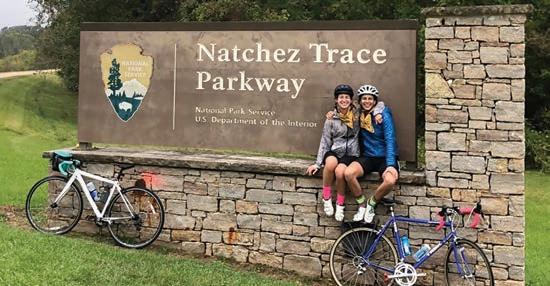
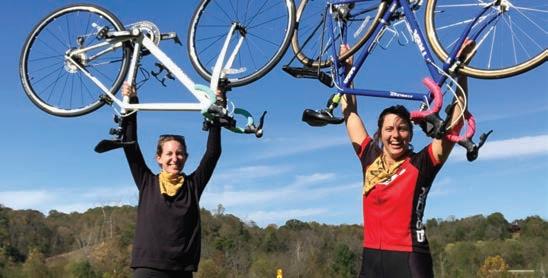
Jared Stillman ’08
Ellie Lentz has joined USN as a Lower School Teaching Assistant.
Julia Garrison, Rachel Zolensky, Juliette Rubin, and Hannah Cornfield have joined forces to support the voting rights restoration efforts to restore voting rights to former felons who have completed their sentences, including parole and probation.
2009
Margie Quinn and Aliza Sir celebrated their 30th birthdays with a fundraising adventure biking 444 miles on the Natchez Trace Parkway to raise funds for local organizations working for justice and fairness in their communities. They raised $12,232 for six organizations across the South doing work in their communities to create a more equitable and just society.
2010
David Steine graduated from Benjamin Cardozo School of Law in January 2020. He passed the Tennessee bar exam and has moved back to Nashville from New York City.
Avi Bregman talked to students in the AP Chemistry class in May 2020 about his career as a Materials Scientist.
Jamie Miller accepted a new position as Judicial Intern with Magistrate Judge Alistair Newbern at U.S. District Courts. Ian Ball was on campus in March 2020 for a lunch and learn with High School students to Aliza Sir ’09 and Margie Quinn ’09 discuss his work at Microsoft Research NYC. He plans to join the Massachusetts Institute of Technology Department of Economics as an assistant professor.
2011
Chicago kindergarten teacher Charlotte Owens was interviewed on “NBC Nightly News with Lester Holt” in August 2020 for a segment about how COVID-19 is affecting teachers and students returning to classrooms.
Sarah Berkman was featured in The New York Times article “What Happened to Those Couples Who Quarantined Together?” in October 2020.
2012
Ellen Jones has been supporting the Nashville community during the COVID-19 pandemic as part of her dietetics program at Lipscomb University, and was featured in an article on the university’s website.
Miro McPherson participated from California in the virtual Home Run for Humanity sponsored by the USN Habitat for Humanity Club in November 2020. Preston Crowder developed “Don’t Look Black” during monthly workshops with Tennessee Playwrights Studio. Nashville actors will read it February 5, 2021 during the Tennessee Playwrights Studio’s Virtual Reading Festival, which is free and open to the public. Visit tnplaywrights.org to register and receive the
Ian Ball ’10 and Director Vince Durnan
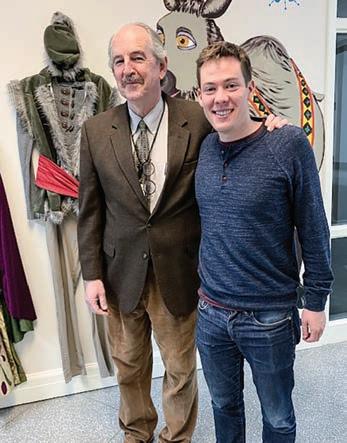

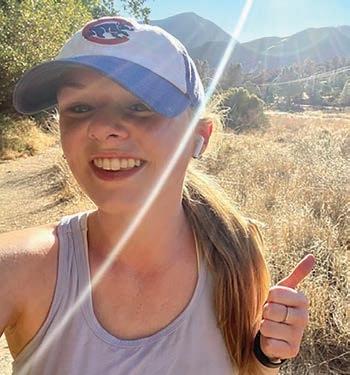
Miro McPherson ’12 Preston Crowder ’12
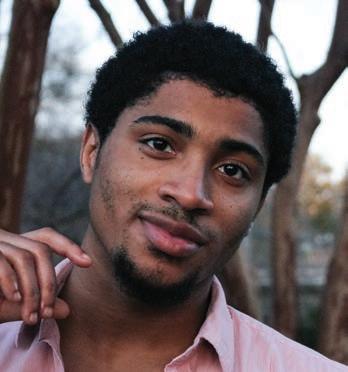
Zoom link. Devoted to social justice and activism, Preston said he aims to create plays that create conversation and address issues facing people of all backgrounds. He is pursuing a Master of Fine Arts in playwriting at The New School.
Freelance guitar player and songwriter Josh Halper was featured in the Nashville Scene in December for his solo debut “Alrightnik.”
2013
William Doak was a guest speaker for AP Chemistry class in May 2020. He talked to the students about work/life balance and encouraged students to have a passion on top of their careers. William is a medical student at Brown University. He has worked in public health in Maine, and his fluency in French, Italian, and Haitian Creole has given him many employment opportunities. He has led hikes in the Alps and enjoys climbing in British Columbia.
Griffin Tanner, Sound Engineer for the Wall Street Journal’s daily podcast, “The Journal,” interviewed with Dr. Anthony Fauci in April 2020 and asked him, “How does life return to normal?” Bryard Huggins released a new song titled “Walk With Me,” available on Spotify. He wrote, composed, and produced this song in light of the social justice movement and for all the people who are marching for change. He said his “goal for this song is to inspire and encourage everyone of all races, creeds, and cultures to keep standing up to injustice and to continue to fight to make the world a better place.” Bryard also recorded a music video of his performance of Richard Smallwood’s iconic hit “Total Praise” in the USN Auditorium. “It’s always so much fun visiting USN and it was especially memorable being able to shoot this video on the same piano I’ve played on in my years at the school,” he said. That’s Hype Productions, the company of his brother Jaran Huggins ’18, filmed and produced the video. The duo also created the video “Stand By Me,” a melody of healing and unity featuring Linde LaChance and artists on Bryard’s independent record label Muse Entertainment.
Maggie Rose is a staff writer on the new Disney / Marvel show, “Moon Girl and Devil Dinosaur.”
2014
Max Plummer, an industrial designer and artist, launched the new venture Great New Tools after restoring an antique wood lathe gifted to him by his grandfather. After a few months of making sawdust on the front porch, and with lots of feedback from friends and family, the three flagship products were ready to be shared with others. This company is the manifestation of that product development and the continuation of the goals and values proposed by the objects.
2015
Walter Hindman was featured in The Tennessean after launching Junkdrop, a trash removal service focused on “connecting those with too much with those with not enough.”
Elena Escalas, recent graduate of University of California, Los Angeles, joined a USN High School Math class in May 2020 to discuss women in STEM. She has accepted a position as a Software Engineer with Google.
Ashtan Towles joined Director Vince Durnan’s Tuesday Morning Coffee in October 2020 to hear Diversity & Community Life Director Roderick White. Ashtan works at the New York City Mayor’s Office for the Prevention of Hate Crimes.
2016
Ben Werther is a graduating senior from Cooper Union and created a platform for his school to showcase their work. This project turned into a huge endeavor, includes over 800 entries from around the globe, and was featured in The New York Times.
Megan Kasselberg helped create a free student run digital platform called Intern From Home where companies post internship opportunities.
Madigan Wheelock joined the USN Admissions Office as the Administrative Assistant. The Wall Street Journal recently published an article in November 2020 by Margo Ghertner titled “Moving to a New Home? How to Avoid Packing Regrets.”
Continued on page 44

Drew Dibble ’18 surrounded by classmates
2017
Lucy Kloeppel, Princeton student and member of the crew team, was highlighted on her team’s Instagram for being a learning consultant at the university. She helps students figure out how to navigate the academic rigors of life at Princeton.
2018
USN alumni and classmates came out to support Drew Dibble, member of Davidson College Wildcats men’s basketball team. Drew was playing at Memorial Gymnasium in December 2019 in the Davidson vs. Vanderbilt game. The Tennessean recently published an opinion editorial by Lola Motley concerning the air pollution issue in the Great Smoky Mountains National Park. Lola is attending Bowdoin College studying math and environmental studies.
2019
Adam Wooten, a gymnast at University of Michigan, was featured on the podcast “Benched Stories with Jacque Young.” He discussed his journey with music while being a high level athlete, his experiences competing as a biracial athlete in a sport that is predominantly white, and the importance of diversity in both the world and the gymnastics setting. Adam is a six-time Tennessee state all-around champion and finished fourth in the all-around at the Junior Olympic National Championships in 2019.
2020
Cole McMillan was named the recipient of the Academic Award during the fifth annual Tennessean Sports Award at sportsawards. tennessean.com. Cole played baseball while at USN.
In an article by NBC News, “Students at Vanderbilt leave fraternities and sororities, alleging racism and insensitivity”, Kate Deegan is featured for leaving her sorority after condemning racism on Instagram and being asked by the sorority to limit sharing her opinion on social media.
Henry Hicks was selected as a Truman Scholar. Henry is a comparative American studies and creative writing double major. The fellowship is awarded in recognition for his outstanding potential as a public service leader. Henry was also chosen by Oberlin College President Carmen Ambar to serve on the Presidential Initiative on Racial Equity and Diversity committee. The committee is made up of 21 members including deans, professors and three students.

Classmates from 2019 gathered for a Friendsgiving celebration in November 2019.
WEDDINGS
Lindsey Mossman ’02 wed Michael Shaw on October 26, 2019.
Ilyssa Berger ’05 wed Josh Wilson on November 9, 2019.
Brooke Sgambati ’07 wed Peter Vizcarrondo on August 29, 2020.
Beth Green ’07 wed Ari Schiftan ’07 on September 14, 2019.
Calle Nielson ’07 wed Jon Barlow on July 20, 2019.
Abby Perlman ’09 wed David Bleckman on April 11, 2020.
Aliza Sir ’09 wed Sam Gerstle ’09 on November 3, 2019.
BIRTHS
Elizabeth Foy ’97 and Michael Wilson welcomed Beau Philip Wilson on November 27, 2019.
Carolyn Hecklin ’02 and Adam Hyatt welcomed Zachary Noah Hyatt on July 20, 2020.
Julie Eskind ’02 and Andrew Galbierz welcomed Sadie Fite Galbierz on May 22, 2020.
Allison and Matt Addison ’04 welcomed Frances on December 17, 2019.
Carla Sandler-Wilson ’04, Josh Wilson, and Aaron Wilson ’33 welcomed Samuel Martin Wilson on May 1, 2020.
Katie Shmerling ’05 and Adam Wayne welcomed Alice Margaret Wayne on December 12, 2019.
Isabel Ross ’06 and William Dale welcomed Warner Ross Dale on February 28, 2020. Florence Page ’07 and Cooper Brown welcomed Margaret “Maggie” Alyson Brown on December 26, 2019.
Jessamine Jowers ’07 and Hunter Burkey welcomed Theodore Isaac Burkey on February 17, 2020.
Emily Strupp ’07 and Edward Linton ’07 welcomed Jonah Akers Linton on November 19, 2019.
Kalpana Vallabhaneni ’09 and Nate Trench welcomed Akhil Trench on July 11, 2020.
Share Your Story
Are you an alumnus who has made special contributions to our society during these challenging times? Or do you know of a classmate fighting aspects of COVID-19 or racial injustices? We want to share those stories on these pages.








